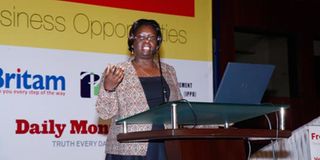Tax gaps: Experts speak out on alternative tax avenues

URA Commissioner General Doris Akol. The Authority is tasked with widening the tax bracket in the country, among other roles.
What you need to know:
Many Ugandans are involved in businesses where they earn more than formal employees yet they are still not taxed. Ismail Musa Ladu points out tax proposals that government can use to increase its revenue collections.
Stellah Mugyenzi is a woman of some means.
She is in charge of her late husband’s estate as well as the farm in the country side.
The farm has more than 200 herds of cattle in addition to several more high breed animals — Friesian cows.
When asked whether she pays taxes, she said: “I am an unemployed widow — I have no (formal) job so how can I be taxed?”
Then there is Phil Mugagga, a landlord in Kampala, with several plots of land in prime areas. He also has several idle chunks of land outside Kampala City Council Authority jurisdiction.
For some reason, he does not pay taxes and he does not seem shy about it. Instead, he brags about it, describing himself as “sharp and smart.”
Many more people are engaged in businesses where they earn much more than people involved in formal employment but do not pay taxes of their earnings.
The above situations are common here. In fact, Mugagga’s case is a little different as majority of those in his position would rather keep silent to remain undetected from the tax collector’s radar.
Much as Uganda Revenue Authority (URA) is already penetrating the informal sector, more needs to be done.
Recently, Finance minister Matia Kasaija proposed a raft of taxes to be collected in the 2016/17 National Budget.
Mr Kasaija proposed to increase taxes on all types of cigarettes, ready-to-drink spirits, cement, motor spirit (gasoline), gas oil (automotive, light, amber for high speed engine), cane or beet sugar and chemically pure sucrose in solid form, motor vehicle lubricants, confectioneries (chewing gum, sweets and chocolates).
He also proposed to increase the rate of the environmental levy imposed on used clothing and used shoes among others.
More taxes will be imposed on the importation of un-denatured alcohol, lubricants, steel and steel products, electronics, including fridges, washing machines, radios, DVD players and television sets, paper and paper products and diapers.
According to the minister, all those increases are minimal.
However, some tax experts and seasoned observers say URA must reach the likes of Mugagga, Mugyenzi and all those outside the taxman’s radar of not paying their fair share of taxes.
When contacted, Ibrahim Kasirye, a tax analyst and a Principal research fellow with the Economic Policy Research Centre, said government an raise more revenue from mobile money transactions that what is already being collected.
According to Kanyomozi Yonasani Bankobeza, a consultant in resource development and management, focus should be put on taxing idle land. But this, he said, will demand that all land is surveyed and proper land titles issued for those without the document.
This should start with land in urban areas, with land developers being among those held responsible.
He also proposed that entertainment is the other area that is not being sufficiently tapped for taxes yet it is a lucrative industry.
A report titled: ‘The Five Year Journey to Transforming Uganda’s Economy; Prospects of the Financial Year 2016/17 Budget in addressing today’s social economic challenges,’ presented recently at the Civil Society Pre-Budget Dialogue in Kampala by the Civil Society Budget Advocacy Group (CSBAG) explored different avenues that the government and URA could pursue to collect revenue.
Ghost workers
According to the Auditor General’s report, Financial Year 2013/14, it was noted that 8,589 employees were not been accounted for by 130 entities. These employees were being paid a monthly total of Shs4.5 billion, which translates into Shs54.7 billion per annum.
Proposals
The report recommends that all accounting officers of votes or entities that have continued to pay ghost workers are held liable for the financial loss caused to save tax payers’ money from fraud and wastage.
It further proposes that biometric verification of government employees on the pay roll should be done periodically; every year.
Other proposals include reintroduction of graduated tax, auditing companies that declare losses for three successive years and imposing a tax on currency conversions.
The report also suggested re-introduction of road tolls on the new infrastructure transport projects especially express highways that are outside the normal public road networks and imposition of special taxes for infrastructure projects.
According to the CSBAG coordinator, Julius Mukunda, the forex market should be tightly regulated with a goal to stop the dollarisation of the Ugandan economy.
He also wants the use of dollars restricted to only import and export transactions. Charging rent in dollars, and accommodation in dollars, for instance, should be outlawed.
Although the CSBAG report commends government efforts in implement public financial management reforms, there are still glaring gaps in mobilising revenue, macroeconomic stability and citizen concerns.
TAX COLLECTIONS
This financial year, URA is expected to collect slightly more than Shs11 trillion. The previous financial year it surpassed its target by about half a billion Shillings.
Tax contribution to the GDP—total economic activities generated in a country every year, is still hovering below 13 per cent, making it among the lowest in the EAC region.
Sources
Re-introduction of graduated tax. The old form of taxation was imposed on adults during colonial days as a replacement to the Hut tax.
Regulating forex market. Experts suggest that dollars should be restricted to the import and export transactions to stop the dollarisation of the economy.
Reintroduction of road tolls. This will be charged on transport projects particularly express highways.




